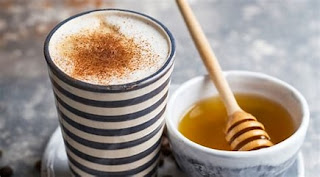If you have trouble sleeping or falling into a deep sleep, try some honey-sweetened herbal tea before bed. The beverage has shown to help ensure a deeper, more restful sleep. It is believed the tryptophan in honey stimulates the production of melatonin, a sleep-inducing hormone. Also, the natural sweeteners in honey are absorbed more slowly than sugar. Sugar can cause blood-sugar dips that are disruptive to good sleep.
Helping you know how to use foods as medicines. You can help your body to heal and stay healthy by the foods you eat!However, with any medical condition, always consult with a physician before any changes in routine, diet or medication.
Thursday, September 26, 2024
Wednesday, September 11, 2024
COMBINING POLYPHENOLS
Scientists are learning that combining two or more polyphenols may team up to improve wellness benefits as well as to boost slimming. Travis Stork, MD, says one of his favorite combinations is coffee with honey. The chlorogenic acid in coffee beans turns on fat burning to speed metabolism. When combined with sweet honey, a natural prebiotic, the pair can reduce bloat and constipation.
Sunday, August 18, 2024
HONEY AS FIRST AID
Honey can pinch hit when you don't have a first-aid kit handy. Honey has natural healing powers that come from natural enzymes that produce hydrogen peroxide. You can apply a little honey to stings and cuts to halt the inflammation and to prevent bacterial growth. Now that is truly a kitchen remedy.
Monday, July 22, 2024
HONEY FOR YOUR BELLY
If you have problems with your digestive system you might want to try honey for relief. Most people know yogurt has probiotic properties but many don't like yogurt or have an allergy to dairy products. Honey basically provides the same benefits as does yogurt. Scientists have discovered honey contains 181 beneficial compounds and many of those act like probiotics. Probiotics are the healthy bacteria found in yogurt that helps ensure proper digestion. Honey can help keep healthy bacteria in the colon and intestines in balance and reduce the number of gas-inducing toxins. The dose? 1 tablespoon of honey a day.
Tuesday, July 16, 2024
HONEY AS MEDICINE
Honey is a tasty natural sweetener, but it is also more than just a sweetener. According to naturopathic physician Shidfar Rouhani, N.D., D.C., a professor at Bastyr University School of Naturopathic Medicine in San Diego, "Honey is great medicine." He says, "It's antibacterial and boosts the immune system. When mixed with other botanicals, it strengthens them too." A tablespoon of honey in a liquid every couple of hours is considered safe for most people. However, you should consult your doctor before prescribing honey as a medicine for yourself, especially if you have health problems such as diabetes.
Friday, June 21, 2024
HONEY FOR THE HEART?
According to an article in the Journal of Medicinal Food, swapping honey for sugar can cut the levels of artery-clogging triglycerides thus cutting the risk of heart disease and stoke by 20%. The credit goes to the antioxidants in honey. I'd say that's a good reason to use more honey and less sugar.
Wednesday, February 7, 2024
Friday, April 21, 2023
A HEALTHY GRANULATED SUGAR SWAP
If you are concerned with your health and would like to improve your diet, here is a good, simple way to start. Start replacing most of the granulated sugar in your diet with honey. As has been discussed earlier on this blog, granulated sugar is basically stripped of all its nutritional value during processing so you are really not getting much nutrition when you consume it. Start using honey to sweeten your beverages, oatmeal, etc. Remember honey has antioxidants so you are trading a nutrient-poor sweetener for an antioxidant-laced one. Honey still has calories though; 22 per teaspoon. However, a University of Wyoming study found that making this switch from granulated sugar to honey could affect hunger hormones in a slimming way. Compared with sugar, honey delayed the rise of ghrelin, a hormone that drives us to eat and it boosted levels of the feel-full compound PYY!
Thursday, March 16, 2023
USING HONEY AS SUGAR
Continuing on with the various types of sugar, today's post is about honey. Honey is often substituted for sugar and people often don't even know why. Here are some facts about honey:
- 1 cup = 960 calories (that is 240 more calories per cup than granulated or brown sugar)
- Chemically, honey has slightly more fructose than glucose.
- Honey's antioxidant quality varies greatly depending on the type. It is important to note that not all honey is the same. The quality depends on where the bees get their nectar. Buckwheat honey usually has the most antioxidants.
- Some of the best uses for honey are dressings, marinades, slaws, etc where it adds a sweet delicate flavor. Many people like to use it to sweeten hot tea.
- When substituting honey for sugar in baking; for 1 cup of sugar called for, substitute 3/4 cup of honey. As with Agave Nectar, reduce the liquid called for in the recipe by 2 tablespoons for each cup of honey subbed. Lower the oven temperature called for in the recipe by 25 degrees for baking.
Wednesday, November 30, 2022
HOW TO STORE HONEY
Honey is the one food that lasts forever. Keep your honey stored in an air-tight jar at room temperature and enjoy anytime. Most grocery store honey is clover honey, but many stores carry a variety. Honey with a paler color has a delicate flavor.



.jpg)





